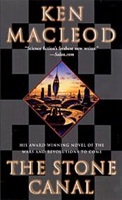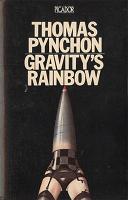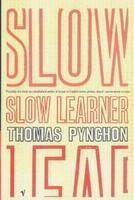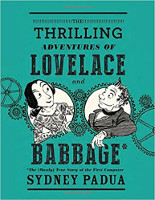 The Stone Canal is the 2nd book in the really rather brilliant Fall Revolution series by the Scottish written Ken MacLeod. This was his 2nd published novel overall (he has 13 novels to his name meanwhile – you see, I'm a bit behind with reading his stuff. My loss!).
The Stone Canal is the 2nd book in the really rather brilliant Fall Revolution series by the Scottish written Ken MacLeod. This was his 2nd published novel overall (he has 13 novels to his name meanwhile – you see, I'm a bit behind with reading his stuff. My loss!).
This is the follow-up to his dazzling debut The Star Fraction, and, believe it or not, he upped the ante.
Before I get going with the book itself a word of warning – this is a review for a book in a series, it will, by its very nature, contain spoilers for the earlier book. If you don't mind then read on, otherwise go & get the first book (The Star Fraction) and read this first. Actually, go and get the entire series (4 books - the other ones are The Cassini Division, and The Sky Road), full stop, it's worth it.
Jon Wilde (yes, the minor character from The Star Fraction) awakens/comes to live next to the eponymous Stone Canal on New Mars. His last memories are of bleeding to death after being shot in Kazakhstan (on good old Earth), with Daniel Reid watching him die. He meets a 'human-equivalent' robot called Jay-Dub, who takes him to Ship City, the centre of human civilization on New Mars.
Meanwhile in Ship City we have Dee Model on the run from some goons who follow her. She is, we learn, a robot mind in a human body, created as a sex toy ('just a fucking machine', Jay-Dub puns), and the main squeeze of 'Big Boss Man' Daniel Reid. Yup, same one. She is rescued from her pursuers by Tamara, an Abolitionist (they want to get rid of New Mars's society's prejudice against intelligent machines), and is taken to Circle Square, which, whilst approaching, she describes as the 'precinct of the dead. Crawling with bad artists, freethinking machines, and anarchists arguing about what to do in an anarchy.' Classic MacLeod territory, then.
The story is told in 3 strands – on the one hand we have the story on New Mars, on the other side of the Daughter Wormhole from the Solar System; on the other hand we have the personal history of Reid, Wilde, and his wife Annette (Dee is a clone of her phenotype... ); and, closely related, the history of the Republic, Kindgom, Republic etc. This last part spans a longer time frame than The Star Fraction, and neatly places that story in a larger framework. All of this comes together in a very smooth and organical way, I was rather impressed how these strands chimed with each other and with the first book in the series.
We have some of the classic SF technology – nanotechnology, scanning brains, growing clones and re-instating memories (this leads to people taking 'backups' – yes please!). And it also leads to the 'Macros', which are blobs of nanomachines, and a hardware platform for millions of uploaded minds, living and thinking at multiple times the speed of 'normal' humans. They're not like us, not anymore. We also have the 'Malley Mile', a wormhole reaching out from the Solar System, named after the inventor of the technology used to create it.
The book overall is better paced that The Star Fraction, and appears more coherent and with fewer (sometimes tedious) stretches of verbal sparring over obscure political points. There is more plot here, with the multiple treads and layers meshing and driving the story. Dare I say that it chronicles a writing finding his stride? Writing the 'future' stuff on New Mars in 3rd person, whilst the bits on Earth are written in the 1st adds a neat touch of 'different feeling' to the various, connected story lines.
I'm looking forward to the other two books in the series – and yes, this is a recommendation.
Title: The Stone Canal
Series: Fall Revolution
Series Number: 2
Author: Ken MacLeod
Reviewer: Markus
Reviewer URL: http://skating.thierstein.net
Publisher: Orbit
Publisher URL: http://www.orbitbooks.co.uk
Publication Date: 1996
Review Date: 100324
ISBN: 1841490601
Price: UKP 6.99
Pages: 430
Format: Paperback
Topic: SF
Topic: Space Opera
More Ken MacLeod













